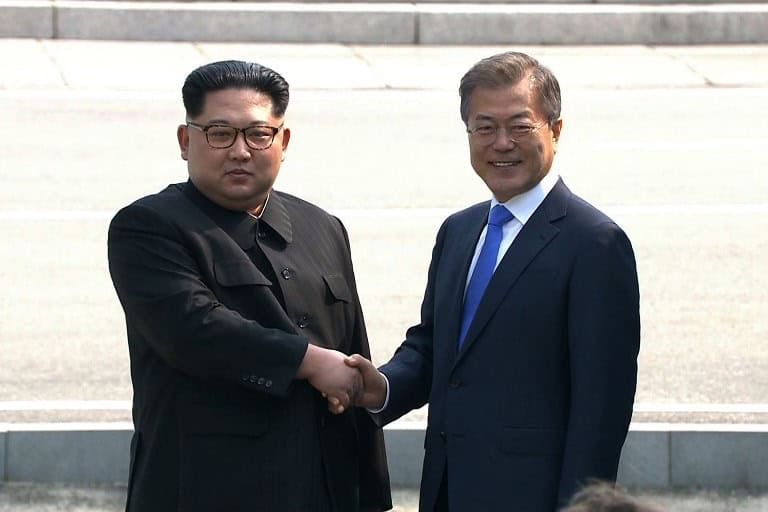Seoul: North Korea on Wednesday called into question a much-anticipated and unprecedented summit between its leader Kim Jong Un and US President Donald Trump set for next month. Pyongyang also cancelled high-level talks due Wednesday with Seoul over the Max Thunder joint military exercises being held between the United States and South Korea, denouncing the drills as a “rude and wicked provocation”.
“There is a limit in showing goodwill and offering opportunity,” the North’s official news agency KCNA said. The drills between the two allies’ air forces were a rehearsal for invasion and “a deliberate military provocation” at a time when inter-Korean relations were warming, it added. “The US will have to think twice about the fate of the DPRK-US summit,” KCNA said, referring to the North by its official acronym. Washington said it will continue to plan the meeting in Singapore on June 12, with State Department spokeswoman Heather Nauert telling reporters it had received “no notification” of a position change by North Korea.
The language used by KCNA is a sudden and dramatic return to the rhetoric of the past from Pyongyang, which has long argued that it needs nuclear weapons to defend itself against the United States. Hostilities in the 1950-53 Korean War stopped with a ceasefire, leaving the two halves of the peninsula divided by the Demilitarized Zone (DMZ) and still technically at war. At a dramatic summit last month in Panmunjom, the truce village in the DMZ, Kim and South Korean President Moon Jae-in pledged to pursue a peace treaty to formally end the conflict and reaffirmed their commitment to denuclearising the peninsula.
But the phrase is open to interpretation on both sides and the North has spent decades developing its atomic arsenal, culminating last year in its sixth nuclear test — by far its biggest to date — and the launch of missiles capable of reaching the US.
The drive has seen it subjected to multiple rounds of UN Security Council resolutions, while Trump and Kim traded personal insults and threats of war last year.
– Olympic thaw –
Relations underwent a sudden turnaround as Moon used February’s Winter Olympics in the South to broker talks between Washington and Pyongyang, before meeting with Kim in the DMZ last month.
The Trump-Kim summit is due in Singapore on June 12, with Washington demanding the North give up its weapons in a complete, verifiable and irreversible way.
High-level talks were meant to take place in the DMZ Wednesday to discuss follow-up measures to the Panmunjom summit between Kim and Moon.
But KCNA called the Max Thunder drills “an undisguised challenge to the Panmunjom Declaration” taking place before the “ink on the declaration had a chance to dry”.
“We cannot but take a step of suspending the north-south high-level talks scheduled on May 16 under the prevailing seriously awful situation.”
In a statement, Seoul’s unification ministry, which handles relations with the North, said it had received a message “in the name of chief delegate Ri Son Gwon that they were postponing the high-level talks indefinitely”.
“Accordingly, today’s high level talks won’t take place and the government will react following consultations among relevant agencies,” it added.
– Thunderstruck –
South Korea and the US are security allies, with each pledged to come to the aid of the other if attacked, and Washington has nearly 30,000 troops stationed in the South to defend it against its neighbour, which invaded in 1950.
The two-week Max Thunder exercise started last Friday and involves some 100 aircraft from the two allies, including F-22 stealth fighter jets, B-52 bombers and other fighters.
“We have not heard anything from (the North Korean) government … to indicate we would not continue conducting these exercises or would not continue planning for our meeting between President Trump and Kim Jong Un next month,” Nauert said Tuesday at the State Department.
The exercises are “not provocative”, the spokeswoman said.
White House Press Secretary Sarah Sanders added: “The United States will look at what North Korea has said independently, and continue to coordinate closely with our allies.”
Washington has often deployed its military hardware in shows of strength to put pressure on Pyongyang — last year, it sent three of its aircraft carriers to the waters off the peninsula simultaneously.
But on Tuesday, the Pentagon called the drills “defensive” in nature.
The North has consistently condemned military drills as preparations for invasion, and in the past has often responded with actions and provocations of its own in a cycle of events.
The major Key Resolve and Foal Eagle exercises, usually around March, have often sent tensions on the peninsula soaring.
But this year, the allies delayed those drills until after the Olympics and Paralympics in Pyeongchang as Moon sought to secure the North’s participation at the Games.
In turn, envoys from Seoul said Kim told them he would “understand” if the exercises went ahead, which they did without incident.
Pyongyang has dramatically toned down its condemnations of its enemies in recent months.
But it has a long history of switching from aggression to engagement, or vice versa.
The day after the Panmunjom summit, KCNA condemned a US exercise to train for the evacuation of its nationals from the South, calling it “an act aimed to make war a fait accompli and incite atmosphere for it”.
Agence France-Presse

